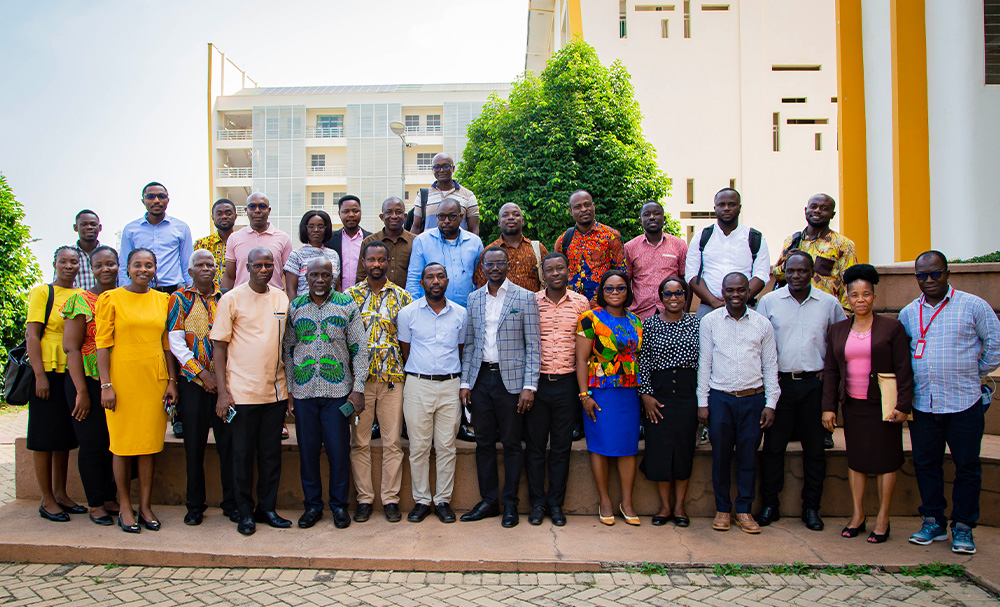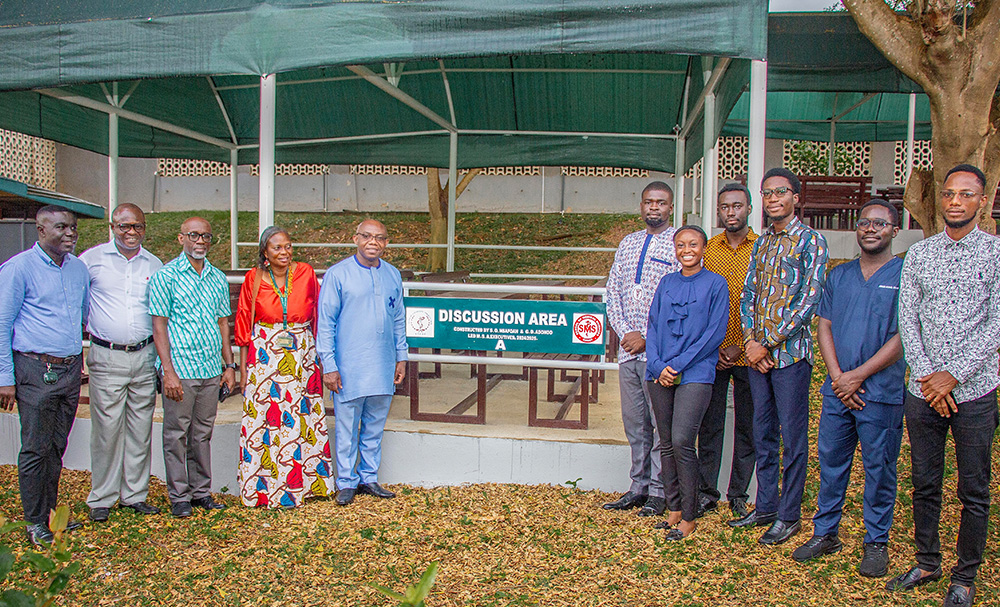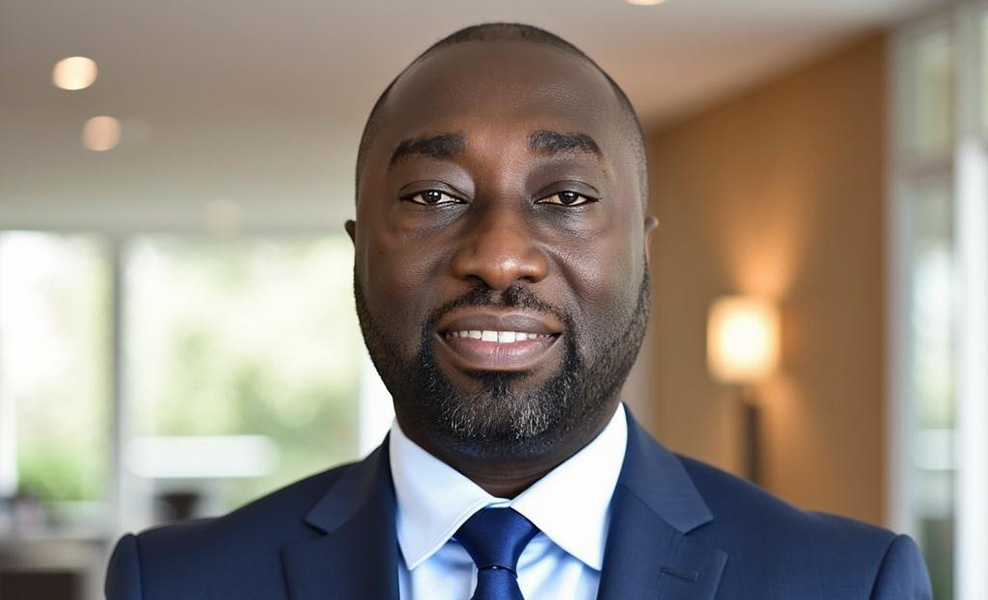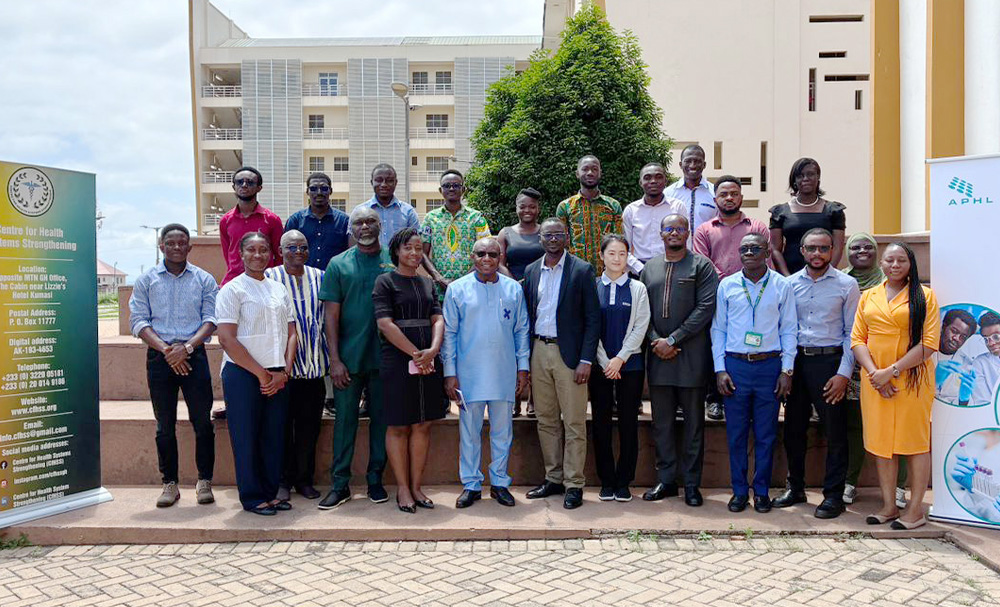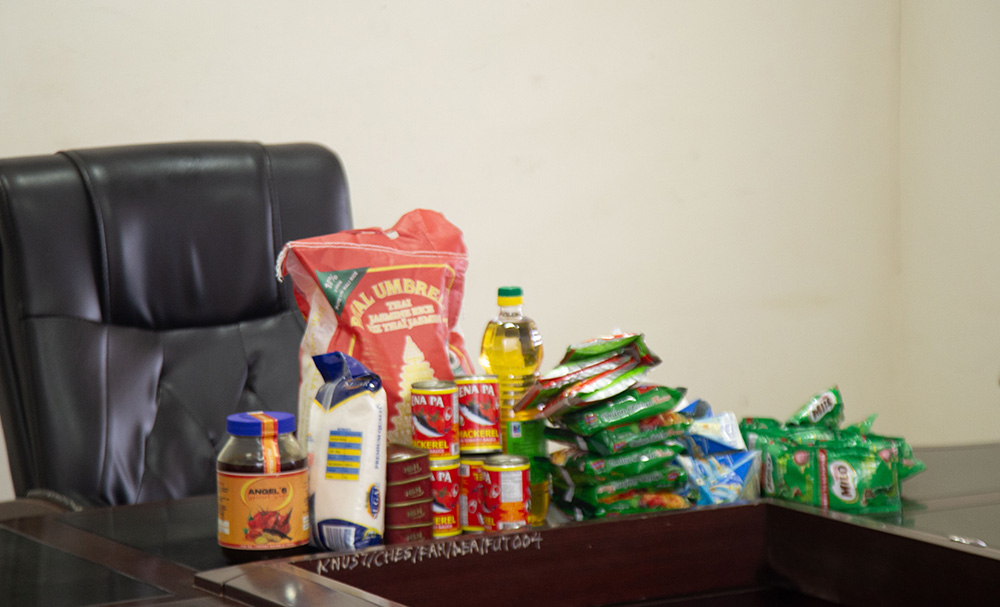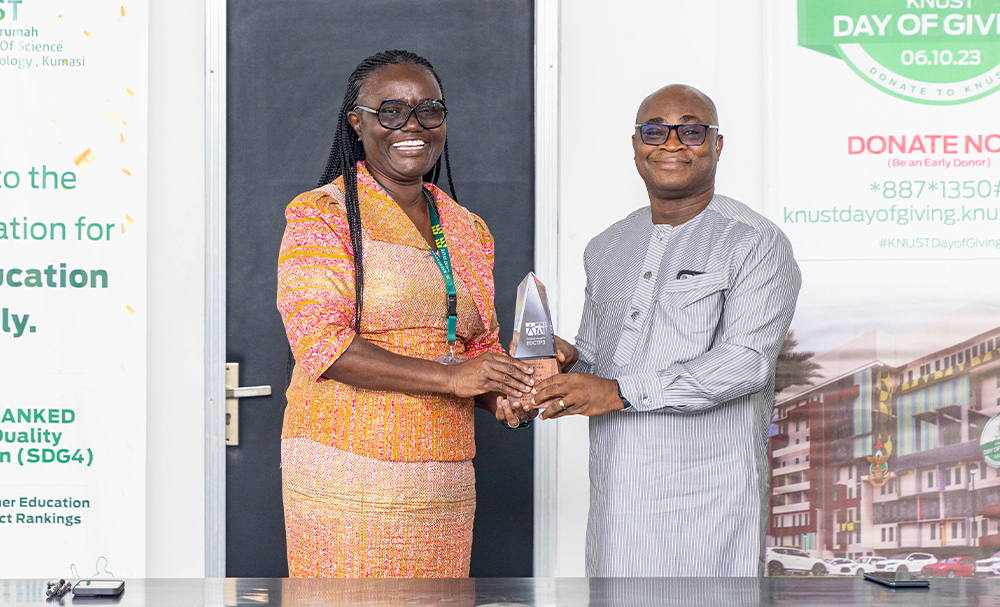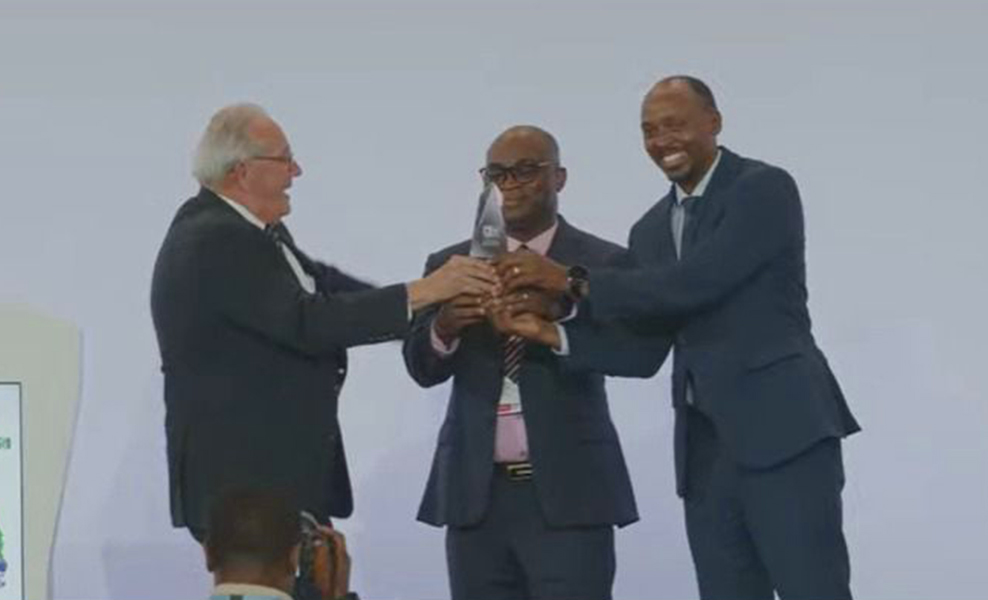The Vice-Chancellor of the Kwame Nkrumah University of Science and Technology (KNUST), Kumasi, through the Public Lectures Committee invites the Academic Community and the general public to a Professorial Inaugural Lecture of Professor Alexander Yaw Debrah scheduled as follows:
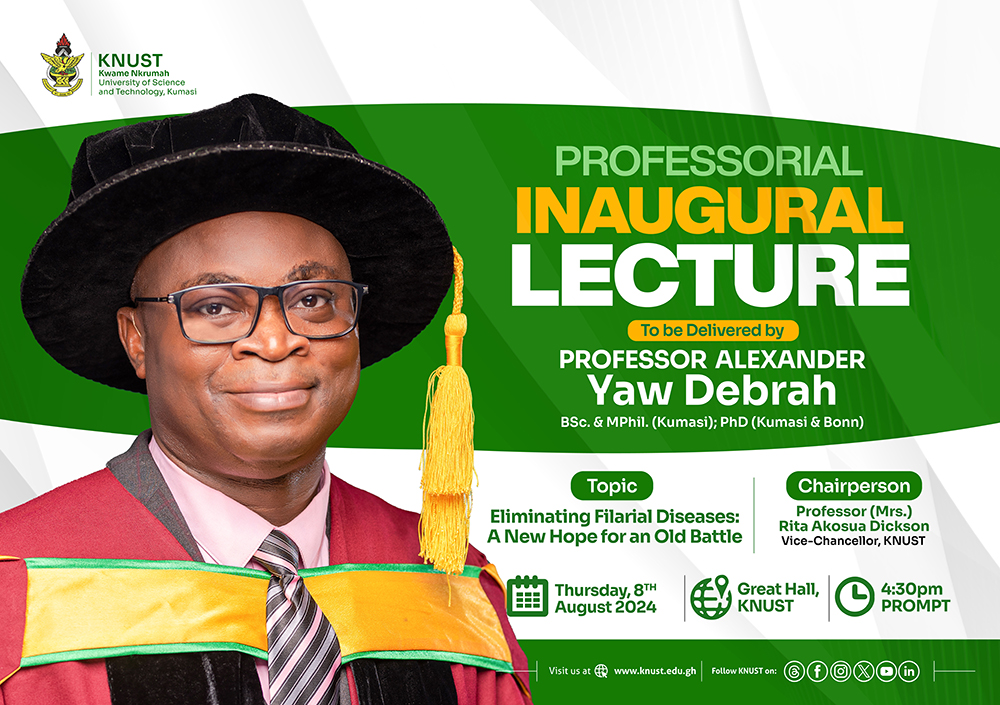
Abstract of the Lecture
Topic: “Eliminating Filarial Diseases: A New Hope for an Old Battle”
Neglected Tropical Diseases (NTDs) are a group of infectious diseases that affect about 1.3 billion people in the world but are mainly prevalent in tropical or sub-tropical areas. They thrive among people living in impoverished communities. There are about 20 of NTDs across the world but mainly in hard-to-reach areas of Asia, Latin America and Africa. NTDs are mainly caused by organisms such as parasites, viruses, fungi and bacteria. They either disfigure or disable their victims, keep children out of school, and parents out of work, thereby limiting their potential and leaving communities in a cycle of poverty. Notable among the NTDs are lymphatic filariasis (elephantiasis), onchocerciasis (river blindness), buruli ulcer, leprosy, dengue, chikungunya, Guinea worm disease, sleeping sickness, rabies and scabies.
Filarial diseases are parasitic diseases caused by round worms called filarial worms. The main ones are lymphatic filariasis (elephantiasis), onchocerciasis (river blindness), loaisis (African eye worm) and mansonellosis. Lymphatic filariasis (LF) and river blindness are the two main filarial parasitic diseases posing significant public health challenges in Africa and other tropical regions. They affect about 140 million people worldwide. These worms are transmitted by blood-feeding insects, leading to chronic and prolonged infections that result in disabilities such as scrotal swelling (hydrocele) and lymph swelling (lymphedema), which could progress to elephantiasis of the scrotum or the legs. LF is transmitted by Anopheles mosquitoes (the same mosquitoes that transmit malaria parasites) across sub-Saharan Africa. About 25 million men are suffering from scrotal swelling and 15 million from elephantiasis.
River blindness, on the other hand, afflicts people living along the banks of major rivers. It is transmitted by infected blackflies called the Simulium, that breed in fast-flowing rivers near remote rural villages. River blindness is characterized by severe itching, disfiguring skin conditions, visual impairment and permanent blindness. Over 99% of the people at risk of river blindness live in 31 countries in Africa. Globally, it is estimated that there are 18 million people infected and 270,000 blinded by river blindness.
There are four major obstacles hindering the effort to control and eliminate filarial diseases. These are (1) Lack of effective treatment for these diseases due to lack of drugs that can kill the adult worms, (2) Lack of understanding of the mechanisms that lead to the development of elephantiasis and hydrocele, (3) Lack of effective tools to report elephantiasis and hydrocele cases for efficient morbidity management, and (4) Lack of sensitive diagnostic tools for the detection of the diseases. These obstacles need to be addressed to be able to eliminate filarial diseases.
The lecture will show how through local and collaborative research and partnership, my research has been able to (1) use innovative means to identify a cheap and registered drug to kill the filarial adult worms which consequently led to finding of new regimens for treating elephantiasis and river blindness in Ghana, (2) unravel the complex mechanisms that lead to the development of hydrocele and elephantiasis of the legs, (3) use digital and mobile health technologies to reach elephantiasis and hydrocele patients in the remotest villages in Ghana for management and (4) demonstrate some problems associated with the current diagnostic tools and what is being done to improve upon their sensitivities and accuracy.
The lecture will touch on some key human and infrastructure capacity built to sustain the research, and the control and elimination of filarial diseases in Ghana.
The lecture will also touch on some of my ongoing research work such as: (1) the use of alternative strategies to accelerate the elimination of lymphatic filariasis and river blindness in Ghana by 2030 using the “Test and treat approach” (2) elucidating antimicrobial resistance (AMR) in infected skin wounds of elephantiasis patients during acute attacks, (3) expanding the digital and mobile health technologies to other NTDs such as yaws, leprosy and buruli ulcer, and (4) why COVID-19 was not too devasting in African population compared to the advanced world due to the presence of some helminthic infections in Africa (SARS-CoV-2 and helminth coinfection).
The lecture will conclude by proffering some relevant recommendations and policy advice such as: measures to take to eliminate NTDs in Ghana and Africa in order to achieve SDG 3 and other SDGs, measures to take to prevent recrudescence of the diseases in previously infected but now free areas; how policy makers can work with researchers and the academic institutions to eliminate NTDs in Ghana and Africa, and the need to include lymphedema patients on the National Health Insurance Scheme (NHIS) and Livelihood Empowerment Against Poverty (LEAP) programme to improve the quality of life in order to achieve universal health coverage.
Profile of Professor Alexander Yaw Debrah
BSc. & MPhil. (Kumasi); PhD (Kumasi & Bonn)
Dean, Faculty of Allied Health Sciences, KNUST
Background
Alexander Yaw Debrah is a Professor of Parasitology and Global Health at the Department of Medical Diagnostics, Faculty of Allied Health Sciences, Kwame Nkrumah University of Science and Technology (KNUST), Kumasi, Ghana. As a Medical Parasitologist and Global Health Advocate, Professor Alexander Yaw Debrah has almost two decades of experience in teaching, research, mentorship, and community service.
Professor Alexander Yaw Debrah hails from Gonu in the Volta Region. His parents are Mr. Joseph Kofi Debrah and Mrs. Mary Debrah. He is the 3rd of 10 children of his parents. He started his basic education at Akyim Boadua in the Eastern Region and ended his Primary education at Esereso D/A School at Esereso in the Bosomtwi District in the Ashanti Region. He had his Secondary School education at Osei Tutu Senior High School where he obtained his ‘O’ Level Certificate and continued to T.I. Ahmadiyya Senior High School for his Sixth where he obtained his Advanced Level certificate. He obtained his Bachelor of Science (BSc. Biological Sciences) and Master of Philosophy (Mphil. Clinical Microbiology) degrees from the Kwame Nkrumah University of Science and Technology (KNUST) in 1998 and 2002 respectively. Professor Alexander Yaw Debrah obtained his doctorate in Medical Parasitology from KNUST and University of Bonn, Germany (Sandwich program) in 2006, through the German Academic Exchange Service (DAAD) scholarship.
Early Career Research Experience
Following his first degree, Professor Debrah had his national service at Komfo Anokye Teaching Hospital (KATH) in Kumasi, after which he secured a postgraduate scholarship at the Kumasi Centre for Collaborative Research in Tropical Medicine (KCCR) to do his Master of Philosophy in Clinical Microbiology on filariasis project. After the Master’s programme, he secured a DAAD Sandwich Scholarship to do his Ph.D in Medical Parasitology at the University of Bonn, Germany in 2003. He came back to Ghana in 2006 to take up teaching appointment at the Department of Medical Diagnostics, KNUST in 2007.
Professor Debrah’s early career research contributed significantly to the knowledge of lymphatic filariasis disease development which was poorly understood in the past decades. His research was among the first to report that lymphedema (or elephantiasis, which is the more advanced form) and hydrocele (scrotal swelling) due to filariasis have a genetic propensity and doxycycline, a very cheap and affordable drug on the Ghanaian market could be used to treat elephantiasis. Due to this groundbreaking findings, some of his Ph.D students advanced the genetics and doxycycline research studies. These studies have helped in explaining the process of elephantiasis development and the mechanism of action of doxycycline for elephantiasis management.
He also researches into river blindness (onchocerciasis), trying to find a drug that can kill the adult worms. When ivermectin resistance or sub-optimal response in river blindness was reported in Ghana, his team successfully used doxycycline to treat those who were not responding to the standard care of treatment.
Academic and Administrative Experience
Professor Alexander Yaw Debrah, joined the Department of Medical Diagnostics at the KNUST as a lecturer in 2007 where he teaches Medical Parasitology at the School of Medical Sciences and the Faculty of Allied Health Sciences. He was promoted to Senior Lecturer in 2011, Associate Professor in 2016, and Professor in 2020.
Professor Debrah has held several positions at KNUST, including Examinations Officer for the Department of Medical Diagnostics (2007-2009); Head of Department of Medical Diagnostics (2009-2012); Dean of the Faculty of Allied Health Sciences (2014–2017; 2018-2022; 2023-date), and Acting Provost of the College of Health Sciences (At various times in the absence of the Provost). He is the Chairman of the Graduate Committee of the College of Health Sciences; a board member of the School of Graduate Studies, and an elected Professorial Representative of the College of Health Sciences on the Academic Board of KNUST. Professor Debrah is currently the Dean of the Faculty of the Allied Health Sciences, KNUST. He has also chaired many committees at the College of Health Sciences of the KNUST.
Additionally, he has held National and International positions, including the Chair of the Planning Committee of the Inter-Science Conference on Antimicrobial Agents and Chemotherapy (ICAAC) of the American Society of Microbiology from 2014-2016. Professor Debrah was the first African to be appointed to this Committee since its formation over 65 years. He was at the same time appointed as the Chairman of Travel Grant Award Committee of ICAAC to help establish Travel Grant Awards for early career researchers travelling from developing countries to the Conference. He was also appointed as a member of the Scientific Review Committee of the European and Developing Countries Clinical Trial Partnership (EDCTP) grant applications (2018-2021), and a member of Scientific Review Committee of many international agencies such as the Africa Research Excellence Fund (AREF), German Academic Exchange Service (DAAD), American Society of Microbiology, and the European Society of Tropical Medicine and Hygiene, among others.
Professor Debrah has organized several international seminars, workshops and summer schools at the Kumasi Centre for Collaborative Research in Tropical Medicine (KCCR) and KNUST for postgraduate students and early career researchers, especially those working on filariasis and other Neglected Tropical Diseases (NTDs). These meetings were attended by participants from Germany, United Kingdom, Australia, Ghana, Cameroon, Tanzania and other African countries.
Professor Debrah has supervised several postgraduate research works and theses including Doctor of Philosophy (PhDs), Master of Philosophy (MPhil) and Master of Science (MSc); and also, research and theses of several undergraduate project work. He has mentored many senior members at the Faculty of Allied Health Sciences and other departments at KNUST as well as research scientists at the KCCR.
Research Outputs and Publications
Professor Debrah’s primary research focus is on Neglected Tropical Diseases (NTDs), particularly filariasis. Additionally, he conducts research on other neglected tropical diseases, such as schistosomiasis and intestinal helminthiasis. He is currently the group leader of the filariasis research group at the KCCR/KNUST and the Director of a multi-country consortium (TAKeOFF), dedicated to 'tackling the obstacles to fight filarial infections and podoconiosis’ in Ghana, Tanzania and Cameroon, funded by German Ministry of Education and Research (BMBF).
Professor Debrah has led many basic and complex clinical research in Ghana and abroad. He has been involved in many clinical trials on drug that target the bacteria (wolbachia) in the adult worm of lymphatic filariasis (Wuchereria bancrofti) and river blindness (Onchocerca volvulus). Professor Debrah has established research partnerships with international institutions, such as the Institute of Medical Microbiology, Immunology and Parasitology, University of Bonn in Germany, Liverpool School of Tropical Medicine, Case Western Reserve University of Cleveland in USA, Washington University in St Louis, USA, University of Buea in Cameroon, National Institute of Medical Research (NIMR), Tanzania, Janssen Pharmaceuticals, and the Drugs for Neglected Disease Initiatives (DNDi), Switzerland, among others. He has produced several documentaries on lymphatic filariasis and onchocerciasis diseases.
As a distinguished research fellow and academic, Professor Debrah in 2023 was invited to deliver a presentation titled 'Tackling the Obstacles to Fight Filarial Infections and Podoconiosis' at the 9th UN General Assembly Science Summit held in New York City. The summit which was organised by the Intelligence in Science (ISC) brought together global thought leaders, scientists, policymakers, and experts from various fields across the world. The purpose of the summit was to address critical scientific challenges that impact our planet today.
Professor Debrah’s research group based at the KCCR/KNUST has over twenty (20) staff, comprising early-and mid-career researchers, trial clinicians, trial pharmacists, Postdoc scientists, PhD students, Masters level research assistants and Master students. He is responsible for their research activities, development and training and leverage support for salaries and training. He has also trained a number of health workers on lymphedema/elephantiasis management. Professor Debrah’s research findings on elephantiasis and onchocerciasis have attracted media attention from reputable local media such as JoyNews, The Daily Graphic and from international media such as BBC Focus on Africa, and Plenamedia.tv. Professor Debrah has over 120 publications in peer-reviewed journals.
Grants and Collaborations
Professor Alexander Yaw Debrah has attracted many grants exceeding Fifteen Million Euros (€15,000,000) from significant funders, such as the Bill and Melinda Gates Foundation, the European Commission, German Ministry of Education and Research (BMBF), the German Research Foundation (DFG), VW Foundation of Germany, the European and Developing Countries Clinical Trials Partnership (EDCTP), Janseen Pharmaceutical Company, among others to the Kwame Nkrumah University of Science and Technology (KNUST). For the past six years, as the Director of the “Tackling the Obstacles to fight Filariasis and Podoconiosis (TAKeOFF) Consortium, Prof Debrah has received over 16 million Euros from German Ministry of Education and Research (BMBF), of which over Six million Euros came to KNUST. The TAKeOFF consortium is made up of five partners, two from German institutions namely, University of Bonn and University of Munich, and three from Africa, namely, University of Buea, Cameroon, National Institute for Medical Research (NIMR) of Tanzania and KNUST. The overall objective of the TAKeOFF consortium is to establish a Filarial Clinical Trial & Research Platform (F-CuRE) to address the patient needs and also train health personnel on how to conduct clinical trials in a Good Clinical Practice (GCP)-compliance manner.
Together with other partners from KNUST, the Technical University Berlin, Charité-University of Medicine, Berlin, and University of Bonn, Germany, Professor Debrah received over 2.5 million Euros from German Academic Exchange Service (DAAD) to establish the German-West African Centre for Global Health and Pandemic Prevention (G-WAC). The Centre, which is one of the eight DAAD-funded Global Centres for Climate and Health aims to address the existential threat of pandemics to the health and welfare of people through trans- and inter-disciplinary research projects, targeting both the main drivers of pandemics and the key pillars of resilient health systems in the WHO framework using One Health approach. Professor Debrah in 2020 also received Five hundred thousand euros (€500,000) from the European and Developing Countries Clinical Trials Partnership (EDCTP) to find alternative treatment strategies using anti-wolbachial drugs to accelerate elimination of onchocerciasis and lymphatic filariasis in Africa.
Professor Debrah has also received special grants from African Research Excellence Fund (AREF) Excell Researcher and Leadership Development Programme and German Ministry of Education and Research to train early career researchers and post-doctoral fellows on grantsmanship, research communication skills and mentorship.
He has served as a board member for many local and international Data and Safety Monitoring Boards for agencies such as Medicines Development for Global Health of Australia, DNDi in Switzerland, DOLF Project of USA, among others.
Awards
Professor Debrah has received many awards including a travel award to attend International Wolbachia Conference in Puerto Rico, Caribbean in 2006; the American Society of Tropical Medicine and Hygiene (ASTMH) Travel Award to attend ASTMH Meeting in Philadelphia, USA in 2007; and International Congress on Parasitology (ICOPA) Travel Award to attend ICOPA Meeting in Melbourne, Australia in 2010. In 2010, Professor Debrah was nominated by the VW Foundation of Germany as one of the promising Young African scientists to attend a forum of Nobel laureates and young promising scientists in Lindau, Germany, where he met and interacted with Nobel laureates. Together with his Bonn partners, Professor Debrah received the prestigious bi-annual main prize of the German Wolfgang Stille Award of the Paul-Ehrlich Society for anti-infective therapy (“PEG”) in 2013 and the prestigious German “Momento Research” Prize for Neglected Tropical Diseases in 2015. He also won both Junior (2008) and Senior (2012) fellowships of European Foundation Initiative on Neglected Tropical Diseases (EFINTD). He received The European & Developing Countries Clinical Trials Partnership (EDCTP) Senior Fellowship grant (2020) for clinical research to accelerate the development of new or improved drugs for onchocerciasis and lymphatic filariasis.
Mentorship
Professor Debrah has provided and continues to provide mentorship for several students, early career researchers and younger faculty. He has a strong interest in the skills development and capacity building of his students and has invested much time and resources in them to make sure they succeed academically and professionally. Many of his postgraduate students have been mentored to become faculty members either at KNUST or in other sister universities in Ghana. He has painstakingly written and received grants from international funders to organize leadership skills workshops for his mentees and young faculty members. He always makes sure that his students are self-motivated and develop the needed approach to accomplish their career aspirations and future endeavours. It is therefore not surprising that his interns, national service personnel and others who come on his projects always want to stay and work with him.
Professor Debrah was nominated by his faculty as the best mentor in the faculty for 2024.
Community Service and Other Engagements
Professor Alexander Yaw Debrah has substantial experience in outreach service delivery. He serves as a member of the Intra-Country Coordinating Committee (ICCC) against neglected tropical diseases (NTD) of the Ghana Health Service, whose mandate is to help eliminate NTDs from Ghana.
Professor Debrah together with his research group have organized several workshops on hygiene-based lymphedema/elephantiasis morbidity management and disability prevention (MMDP) for both elephantiasis patients and health workers in the Upper East and Western regions of Ghana where he undertakes his research work.
Together with his collaborators, Professor Debrah has treated more than 5000 patients with anti-wolbachial drugs, provided elephantiasis-affected persons with hygiene materials (antibacterial soap, basin, towel, topical creams), and carried out over 1000 nodulectomies (surgical removal of onchocercal nodules from river blindness patients). In collaboration with the Nana Hima Dekyi government hospital in the Ahanta West District of Ghana, Professor Debrah and his collaborators carried out free surgeries for over 50 hydrocele patients in the Western Region of Ghana in 2023 alone.
Family
Professor Alexander Yaw Debrah is married to Dr. (Mrs.) Linda Batsa Debrah, a Senior Lecturer and the Examination Officer at the Department of Clinical Microbiology, School of Medical Sciences, KNUST and the winner of the prestigious KNUST 2023 Mid-Career Best Research Award and the 2024 Best Teaching Staff of the School of Medical Sciences (SMS). The couple are blessed with four (4) children - Gilbert, Vanessa, Kelvin and Caleb. He is a Christian and worships at the Living Waters Assemblies of God Church, Kumasi. He enjoys outdoor work-outs and playing table tennis as hobbies.


